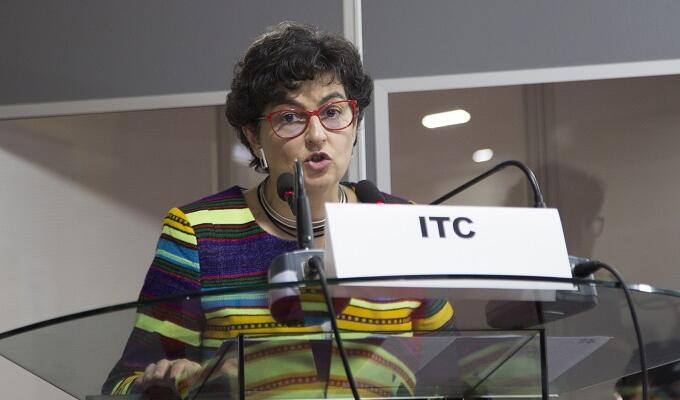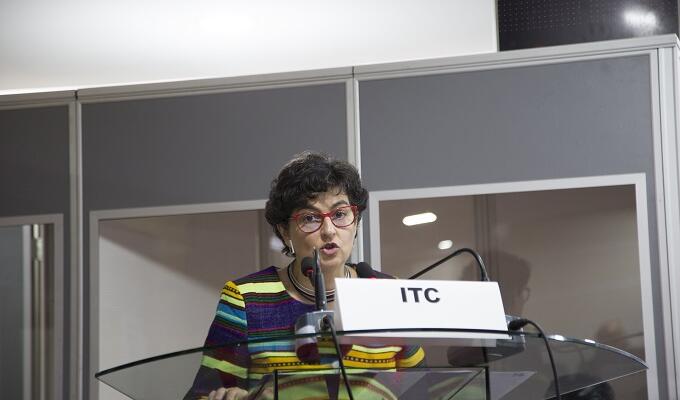

Plenary statement by ITC Executive Director at the General Debate - UNCTAD XIV 2016
21 July 2016 - Nairobi, Kenya
Ladies and gentlemen,
Thank you to the Government of Kenya for hosting UNCTAD XIV and to Secretary General Kituyi for leading on turning the Sustainable Development Goals into reality. The International Trade Centre is pleased to be your partner.
2015 was a landmark year for international cooperation. It was a year of multilateral agreements. It is now time, as UNCTAD XIV motto puts it, to move from decisions to action.
The International Trade Centre is focused on transforming these goals into impact on the ground. Our raison d’être is to make trade happen. To enable the private sector in developing countries to translate international market opportunities into actual trade flows. And to translate these trade flows into sustainable and inclusive economic growth and jobs.
Some say that the 2030 Agenda for Sustainable Development is ambitious but unwieldy. The fact is that complex challenges never have simple solutions. The SDGs are the agenda we need on inclusive growth, equity, and environmental sustainability.
Trade is rightly at the heart of this agenda. To meet the goal of eradicating extreme poverty by 2030, the biggest steps are needed in the countries and the communities that have been most excluded from the development gains of the past three decades.
It is no coincidence that these countries and communities are the very ones that have been the least connected to international trade and investment. And it is no accident that these are the countries and communities that are at the heart of ITC’s work.
Nearly 80% of ITC’s interventions last year were in least developed countries, sub-Saharan Africa, small-island developing states, small and vulnerable economies and post-conflict states. Both in these priority countries and elsewhere, we place a special focus on people at the bottom of the economic pyramid: women, youth, refugees and the poorest communities.
We believe three areas for action would help maximise trade’s contribution to achieving the SDGs.
One: SMEs. Micro, small and medium-sized enterprises account for the vast majority of jobs everywhere. When they boost productivity and internationalise, the resulting growth is more inclusive. Trade-related fixed costs weigh heavily on the competitiveness of smaller firms: that’s why it’s so important to implement the WTO Trade Facilitation Agreement, and to reduce the time and cost associated with complying with standards and other non-tariff measures.
Two: e-commerce. The internet makes it possible for SMEs to connect directly with customers around the world and to capture more value per sale by cutting out costly intermediaries both for goods as well as for services. But in many developing countries, SMEs struggle to access international platforms, payment systems, logistics, and after-sale services.
In partnership with the private sector, with eBay and DHL, ITC has developed a suite of solutions for SMEs to overcome these hurdles. Policy reform – such as simplifying customs rules for low-value transactions or opening up services trade - has an important role to play in facilitating digital trade. I’d like to salute the leadership of UNCTAD’s "E-Trade for All" initiative, which is a useful platform to help tackle the spectrum of challenges holding developing countries back in online trade.
And last but not least: women. Without gender equality, we will not eradicate poverty. Women’s economic empowerment yields rich rewards for families, communities, businesses, and entire countries. Trade offers great potential gains for women-owned businesses. This is why ITC has launched the "SheTrades" initiative to connect one million women entrepreneurs to markets by 2020.
Last week in Abuja, ITC the Nigerian government, in collaboration with ITC, announced how it would support over 100,000 women entrepreneurs to access new business opportunities at home and abroad. And this past Friday, here in Nairobi, ITC and Barclays Bank of Kenya launched a SheTrades partnership to provide financing and business and management training to 10,000 women entrepreneurs.
Moving from trade and investment agreements to trade and investment flows. Putting trade at the service of sustainable and inclusive growth. Using trade as a means to end extreme poverty. This is our challenge. And the ITC is ready to be your partner in these endeavours.
Thank you for your attention



